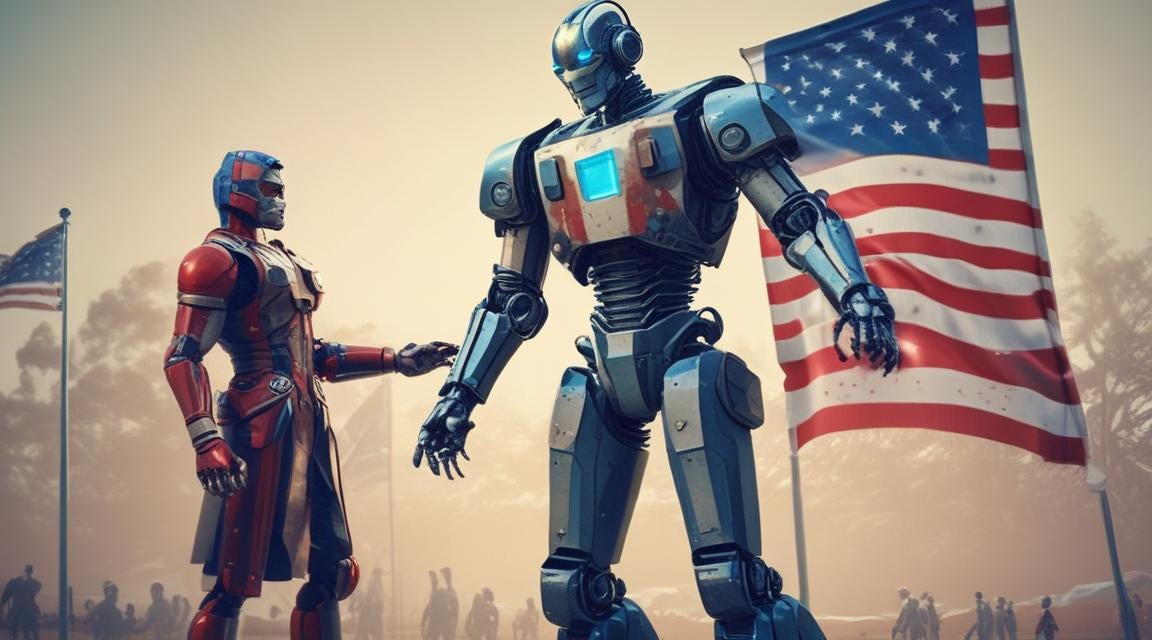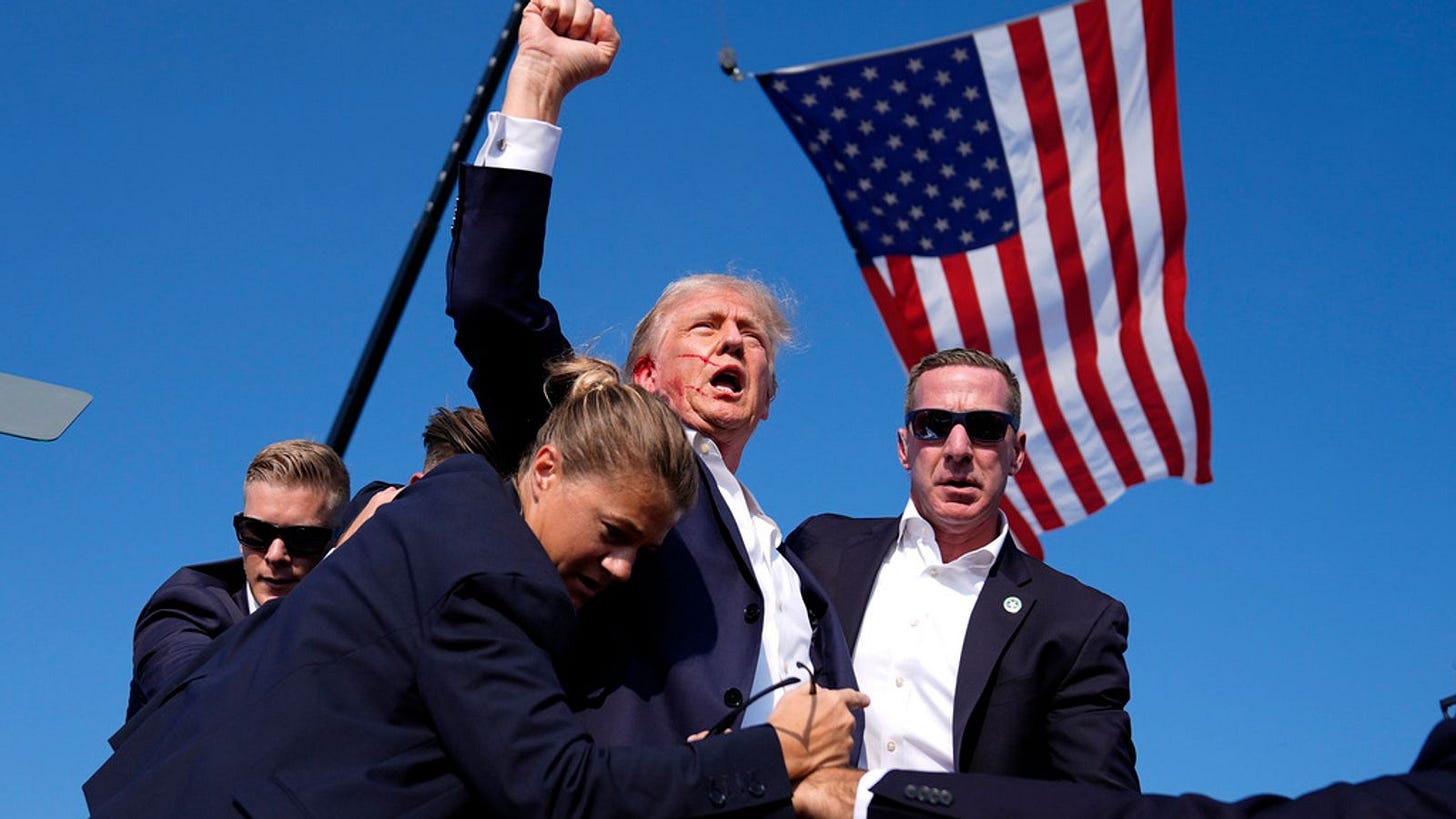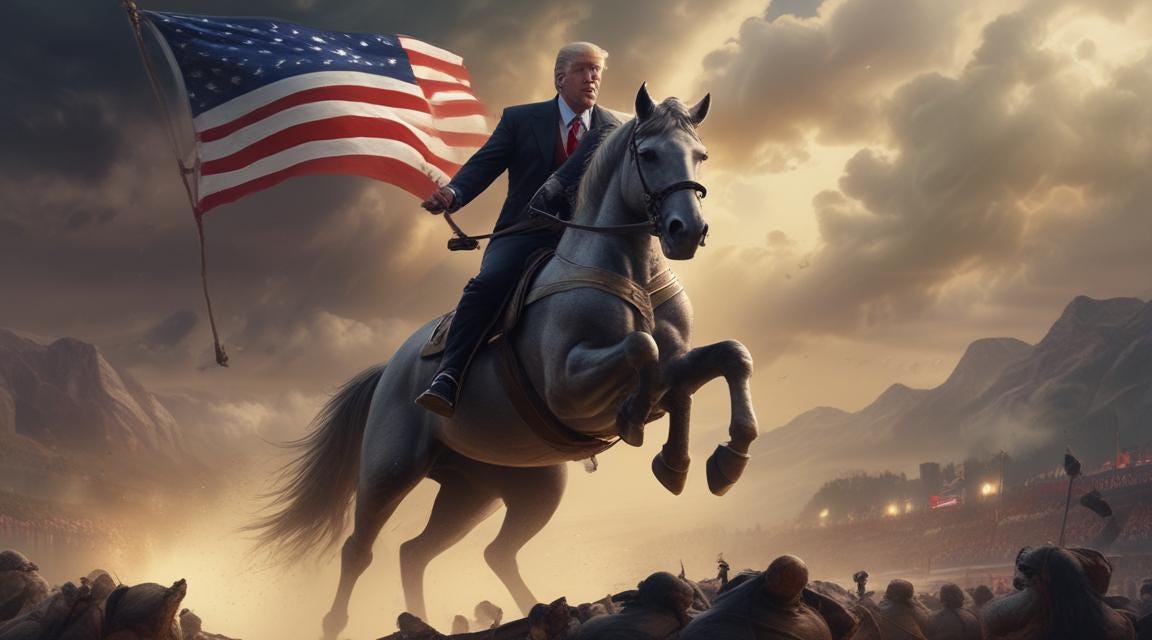The future holds many uncertainties - futures always do - and among our current question marks are two significant theoretical events: the Technological Singularity and the Existential Crisis of the Fourth Turning. These concepts represent pivotal points in competing theories of human history and have been the subject of much debate and speculation - more speculation than debate, perhaps, because both seem to share a closer relationship with fantasy or science fiction than any serious, scholarly road map of the future. This disdain is most common among those with the sort of mind shackled by normalcy bias.
The Technological Singularity is a hypothetical point in the future where technological growth becomes uncontrollable and irreversible, leading to unforeseeable changes in human civilization and even humans themselves. This concept usually suggests that artificial intelligence will at some point become conscious or, most specifically, self-conscious and at approximately the same time become able to create improved versions of itself, thus “reproducing” at rates dictated by digital rather than human reproductive speeds - instead of a generation every thirty years, a generation every thirty seconds. This is commonly referred to as a “hard takeoff.” The implications of such are obvious, which is why leading proponents of the notion sometimes refer to such an outcome as leading to an "intelligence explosion," which could be more threatening to humankind than a nuclear explosion. The two are similar, in that both a nuclear explosion and an intelligence explosion would proceed with no human guidance of the process, greatly increasing the possibility of a bad (for humans) outcome, since the one single explosion could potentially affect every single aspect of human existion. This event could result in a transformation of society in ways we cannot currently comprehend, with both positive and negative outcomes possible.
On the other hand, the Existential Crisis of the Fourth Turning is a concept from the Strauss–Howe generational theory, which posits that history is cyclical and consists of repeating generational patterns that culminate in a two-decade (ap-proximately) period of crisis every every sixty years or so. This crisis is characterized by widespread upheaval and transformation, challenging existing systems and institutions. It is a period marked by conflict, social unrest, and the potential for destructive change, (famine, economic destruction, war) but in either case, the existence of the United States will hang in the balance, and the outcome could go either way. There are no guarantees, at least according to the theory, that the crisis would be resolved in terms favorable to a continuation of America as we currently know it.
Comparing these two events is challenging because they stem from different domains of thought—one from technological forecasting and the other from sociological theory. The Technological Singularity is rooted in the progression of artificial intelligence and its potential impact on society, while the Fourth Turning focuses on generational dynamics and historical cycles.
Predicting which event will occur first is a complex endeavor. The Technological Singularity has a more variable timeline, with some experts suggesting it could happen within the next few decades, while others believe it is still a long way off or that it might not happen at all. The Fourth Turning, however, is based on a more historical and cyclical perspective, suggesting that we may be on the cusp of such a crisis based on past patterns.
It is important to note that these theories are not universally accepted and come with their share of skepticism and criticism. The Technological Singularity, for instance, is seen by some as an overly optimistic or pessimistic view of technology's trajectory, depending on one's perspective. Similarly, the Fourth Turning theory has been criticized for being overly deterministic and lacking rigorous empirical evidence, which is, to my mind, something of a bad cop, given that all cyclical theories of human history lack rigorous empirical evidence.
As of now, when we are probably in the position of experiencing both at the same time, whether the Technological Singularity or the Existential Crisis of the Fourth Turning will arrive first remains an open question. Both events, should they occur, would entail significant shifts in the human experience.
Both concepts encourage us to think critically about the trajectory of our society and the potential for profound change.
UPDATE: This essay was headed in a different direction, but events have intervened - mainly the assassination attempt on President Trump last Saturday in Butler, PA - which have given me a reason to look at the interplay between the Technological Singularity and the Crisis of the Fourth Turning from a somewhat different point of view.
The Z-Man opined this morning:
A Russian blogger got it right. “In the eyes of the US population, Trump will be promoted as the living embodiment of that very “American Dream” – a self-made billionaire, an American patriot, whom his enemies tried to kill for his love for his homeland, while being protected from all troubles by the Higher Powers.” For many in heritage America, Trump stopped being a politician on that stage and became a symbol around which they can rally against the forces of darkness.
That is when the battle is joined. Until now, the cold civil war has been a one-sided affair, because white people did not know there was a war. They told each other that the actions of the regime were for money or power. Now they are starting to sense it is about something else. The “existential threat” is not against “their democracy” but against heritage Americans. If the regime thinks killing Trump is funny, they will have no qualms about killing you and your family.
Assassinations are often triggering events. The most famous was the assassination of Archduke Frans Ferdinand. That kicked off the Great War. The assassination of Kennedy kicked off the cold civil war that still rages today. Perhaps in time the failed assassination of Trump will be seen as the turning point in the cold civil war, the point when the good guys finally figured out that they are under attack and begin to organize a resistance against the gathering darkness.
Normal Americans will do almost anything to avoid confronting uncomfortable truths that demand they make significant changes in the their thinking and their lives in order to deal with the personal threats these truths reveal. They will turn themselves into pathetic targets for gaslighting by their enemies, almost begging to be told not to believe their lying lies even when the most outrageous assaults on their normality biases occur.
The assassin who missed by an inch or less in his attempt to assassinate President Trump is a case in point. On Sunday, the day after his murder attempt, I had dinner with half a dozen family members. All are conventionally liberal - teachers, nurses, unionized laborers. Not once during the entire meal was the Trump assassination attempt mentioned. In fact, nothing about any sort of current events made any sort of appearance in the anodyne conversations about a recent vacation to Colorado, the weather (so very hot in Indiana in mid-July - must be global warming at work) and so on.
But I sensed an undertone of desperation to the affair, as if each participant clutched at the hands of the rest and silently begged that nobody bring up the unsettling events that might force them to acknowledge that malign forces had somehow coalesced out of nothing and were threatening to erase everything they had always accepted as a Normal American Way of Life.
Nobody likes the cockroach discovered sitting atop the wedding cake. Nobody likes the Black Crow who brings bad news to the happy birthday party. Don’t rock the boat. The nail that sticks up will get hammered. Go along to get along.
Yet at some point reality itself gets the final vote. Americans are beginning to sense, despite every attempt to avoid doing so, that America has gone, and continues to go, badly wrong. As this unease continues to spread and deepen, the conditions will occur for one of those generational preference cascades that end up in the history books in articles that begin, “And then, event X changed everything…”
Meet such an event:
One aspect of a climatic Fourth Turning has been very little remarked upon: The concept of the Gray Champion, perhaps because the author of the concept has specifically denied that the most obvious candidate for the position is not the Gray Champion.
Here’s a thumbnail description of Strauss and Howe’s concept of a Gray Champion:
In their 1997 book, "The Fourth Turning: An American Prophecy", authors William Strauss and Neil Howe discussed how each crisis period or Fourth Turning, had its “Gray Champion.”
This character from Nathaniel Hawthorne’s “Twice Told Tales”, responded to pleas from the people of Colonial Boston to intercede on their behalf, with the oppressive English regime that ruled New England in the late 1600’s. "The Gray Champion" arrived without warning, intimidated the British into submission, and disappeared as quickly as he came.
While "The Gray Champion" was a fictional character in Hawthorne’s story, author’s Strauss and Howe assert in their book that in actuality, similar characters have indeed shepherded the country through its most difficult and trying times, from the American Revolution to the Civil War, and the Great Depression and World War II.
"The Gray Champion”, according to the authors, must be of a prophet generation, one of the four archetypes that all generations fall into (all generations are a prophet, a nomad, a hero, or an artist). Prophet generations throughout American history have included the Puritan generation, born 1588 to 1617, the Awakening generation, born 1701 to 1723, the Transcendental generation, born 1792 to 1821, the Missionary generation, born 1860 to 1882, and the Boom generation, born 1943 to 1960.
The Puritan generation produced the likes of John Winthrop, while the Awakening generation gave us Benjamin Franklin. The Transcendental generation gave us Abraham Lincoln; with the Missionary generation producing Franklin Delano Roosevelt (FDR).
Reviewing the names above, one can definitely see a few “Gray Champions” in America’s past. John Winthrop inspired the original Puritans to build “a City upon a Hill”, with his “A Model of Christian Charity” sermon on the voyage from England to America, and continued to shepherd over the Massachusetts Bay Colony as one of its Governors.
Benjamin Franklin made numerous contributions to the founding of the United States, not the least of which was participating in the writing and signing of its Declaration of Independence. Abraham Lincoln led America away from the darkness of slavery, and through the horrors of the American Civil War, while FDR led us through the recovery from the Great Depression, as well as World War II, humanity’s attempt to extinguish itself.
As Trump began his first term as President of the United States, he was such an obvious candidate to don the mantle of Gray Champion that Neil Howe ended up specifically denying that Trump could be this purported Gray Champion, as I noted four years ago:
Neil Howe – The Pandemic and the Fourth Turning - Articles - Advisor Perspectives
With two 70-year olds contesting for the U.S. presidency, Howe said that Trump is not a fourth-turning leader. He is stuck in the third turning, unable to adapt the persona of the “grey champion” who galvanizes younger generations to act.
I responded:
I suspect Howe is just talking out of his liberal academic/financial background, or his ass, or both.
He'd essentially have to tear up his theory about Fourth Turnings and Gray Champions to make this stick. He doesn't like Trump, but that doesn't mean he can simply read him out of the role history and Howe's theories have called him to. Especially since he has no real idea who, what, or how the Millennials will act when the chips go down on the table.
History’s call grew both unmistakable and unavoidable two days ago in Butler, PA. I think even Trump himself now understands what his role is to be going forward.








Almost forgot. Had Sunday dinner (as we do most Sundays) with Mom-in-law and two brothers-in-law and their wives. All spent most of the last 40 years in Chicago suburbs and are loyal, but fairly moderate, liberal Democrats. I doubt if any of them have ever voted for anyone but a Democrat. So dinner was interesting. The older b-i-l is kind of mouthy about policis in general, and doesn't know nearly as much about the mechanics of either government or politics, but generally is a nice guy. The s-i-l pair are nice. In fact I like all of them.
But it was very quiet from when we got there a 4:30 until 7:30 when we left. They really, really quite obviously didn't want to talk about the shooting. At all. So I stayed quiet. (My lovely wife says I show remarkable restraint, for me, when her brother says something dumb about politics.)
Towards the end of the meal, the younger s-i-l said, "Well, I guess the election is over" in kind of a dejected voice. The rest agreed. Not quite despair, but not really far from it. The older b-i-l and his wife live in IL. The younger and his wife and Mom live in IN like we do. No one's vote was likely to change the state outcome in any way, but it was interesting to see the dejection.
Bill, a great entry. It caused me to think a few things. One is that the great run of humanity everywhere, not just in the US, really wants the stability of tomorrow being pretty much like today. Because if tomorrow is like today, if I make it through today I'll probably make it through tomorrow, too. That persists right up to the moment that enough people don't think they're likely to make it through today. Thanks to Bidenomics I suspect we're getting close to that point.
A second is the the generational theory may be unique to America because for over 350 years (even pre-Revolution) "Americans" have had a kind of real democracy that has never before existed anywhere else that I can recall. Every adult male (and later females, by law) has had the "right" to rise as far as his talents, resources, strengths, etc can take him. I think that leads to a 'fourth' generation every 80 years or so that arises in a time when such advancement has been made more difficult due to oler generations inhabiting so many of the "good spots" while the belief in such rising persists. So, the fourth generation grows restless and wants to "tweak" the game.
Third, when I was studying and writing on leadership for my dissertation, my wife pointed out that most, or all, of the historical figures agreed upon as leaders (Moses, Napoleon, Lincoln, Ghandi, Hitler, Mao, etc) appear to come NOT from the center of the current society/culture, but from the edges, knowledeable enough to see and know the problems of that society/culture, but enough of an outsider to be able to 'lead' a rebellion against the current elite. That fits Trump. Not really an 'insider' but close enough to the power structure to understand it, but not really an outsider, who still knows how to harness the power of the unhappiness he feels within them.
Finally, maybe, mostly we don't NEED leaders. We need/want managers, who effectively and efficienty get us to a known destination. Only when we no longer have a common destination in mind do real leaders arise. Otherwise they're just troublemakers. I think we're at the point now, that the "outsiders" really want someone to lead us to a new destination that he chooses. (I say he, knowing that with perhaps the exception of Elizabeth I, it's not obvious that any female leaders have existed in the larger sense.) And of course real leaders can be dangerous because they MAY lead to a destination that is bad when we get there. Napolean, maybe. Mao and Hitler for sure.
Until I "aged out" I used to explain the leader/manager dichotomy by referring to Star Trek. Capt Kirk was a leader. He pointed and said, "Thataway!!" and people followed. Capt Picard was a manager. He gathered his advisers together, they discussed and dissected the problem. They agreed on a solution, and he said, "Make it so."
Discussion for later: Most of the successful leaders decided direction but were closely accompanied by a manager who organized the trip. Moses had Aaron. Ghandi had Nehru. Mao had Chou, and so on. Perhaps Lincoln and Napolean didn't. I haven't looked deeply in those cases.
Anyway, Trump has displayed all the classical (to me) traits of the kind of transformational leader we truly think of when we use that term. I might argue that among Presidents only Lincoln also fits the term.